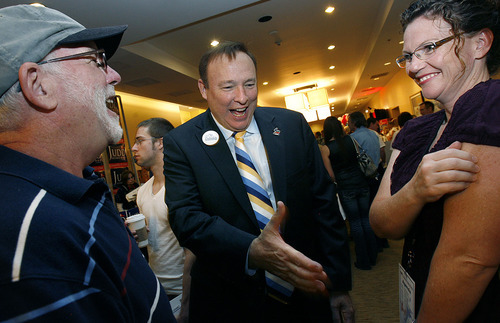This is an archived article that was published on sltrib.com in 2011, and information in the article may be outdated. It is provided only for personal research purposes and may not be reprinted.
Prosecutors in the U.S. Attorney's Office on Sunday filed a motion to dismiss nearly one-third of the charges against a Brigham City orthopedic surgeon who allegedly prescribed painkillers to patients without legitimate medical needs.
The surprising motion for dismissal of 38 counts came on the eve of the Monday trial of Dewey C. MacKay in U.S. District Court before Judge Dee Benson.
Assistant U.S. Attorney Michael Kennedy wrote in a motion that the case against MacKay can be more efficiently tried without the charges.
MacKay's defense attorney, Peter Stirba, called the motion for dismissal "favorable" to his client and said it's proof that prosecutors don't have a strong case.
"The fact of the matter is these charges never should have been brought," Stirba said Sunday evening.
The 64-year-old MacKay was indicted last August with 129 counts related to prescribing more than 1.9 million hydrocodone pills and nearly 1.6 million oxycodone pills between June 1, 2005, and October 30, 2009.
The first two counts are tied to the death of a patient in 2006, according to the indictment.
MacKay dispensed more hydrocodone than any other doctor in Utah, according to the U.S. Attorney's Office. He saw 100 to 120 patients in an eight-hour workday, running them through four exam rooms every three to five minutes, prosecutors say.
The Drug Enforcement Administration revoked his authorization to prescribe controlled substances after completing the investigation that led to his indictment.
Stirba says his now-retired client denies wrongdoing and that he was within his rights to prescribe the drugs while operating a "chronic pain practice."
The prosecution's motion for dismissal creates more questions in a case that has had a bizarre series of pre-trial hearings, including recent arguments in which Stirba made a shocking allegation involving an amputated finger and a luncheon display.
Stirba claimed that the testimony of Michael H. Sumko — one of the doctors who reported concerns that MacKay was prescribing an unorthodox amount of painkillers without conducting full exams on patients —should be discredited because of Sumko's own record of unethical behavior.
Stirba accused Sumko — an orthopedic surgeon affiliated with Brigham City Community Hospital — of placing a patient's amputated finger on a food display at a luncheon with hospital associates.
Stirba said the finger was discovered when "someone who attended was about to eat it." That person, another hospital employee, reported the incident to administrators, Stirba said.
Stirba cited the incident as an ethics violation under American Medical Association guidelines and said Sumko "violated the canons of ethics," which should factor in his testimony against his former colleague.
Sumko has disputed the ethics accusations against him.



